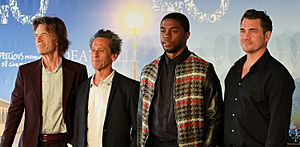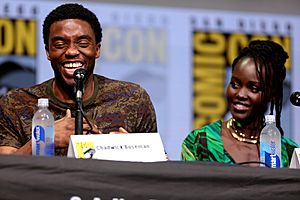Chadwick Boseman facts for kids
Quick facts for kids
Chadwick Boseman
|
|
|---|---|
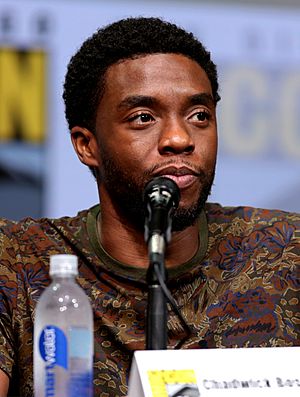
Boseman at the 2017 San Diego Comic-Con
|
|
| Born |
Chadwick Aaron Boseman
November 29, 1976 Anderson, South Carolina, U.S.
|
| Died | August 28, 2020 (aged 43) Los Angeles, California, U.S.
|
| Cause of death | Colon cancer |
| Alma mater | Howard University (BFA) |
| Occupation |
|
| Years active | 1993–2020 |
| Spouse(s) | Taylor Simone Ledward |
| Awards | Full list |
Chadwick Aaron Boseman (born November 29, 1976 – died August 28, 2020) was an amazing American actor. He was known for playing many important real-life heroes and for his role as the Marvel Comics superhero Black Panther.
Chadwick's career lasted for twenty years. He won many awards, like two Screen Actors Guild Awards and a Primetime Emmy Award. He was also nominated for an Academy Award.
After studying directing at Howard University, Chadwick started his career in theater. He won awards for his acting and directing. He also wrote plays, including Deep Azure in 2005. He then moved to TV and movies. His first big TV role was in Persons Unknown (2010).
Chadwick became famous for playing baseball legend Jackie Robinson in the 2013 movie 42. He continued to play other famous people, like singer James Brown in Get on Up (2014) and a young Thurgood Marshall in Marshall (2017).
He became a global star as Black Panther in the Marvel Cinematic Universe (MCU). He appeared in four MCU movies from 2016 to 2019. The 2018 Black Panther movie was a huge hit. It earned him an NAACP Image Award and a Screen Actors Guild Award for Outstanding Performance by a Cast in a Motion Picture. He was the first Black actor to lead an MCU film. Time magazine named him one of the world's most influential people in 2018. His last performance as Black Panther was a voice role in the Disney+ show What If...? (2021). He won a Primetime Emmy Award for this role after he passed away.
In 2016, Chadwick was diagnosed with colon cancer. He kept his illness private and continued acting. He passed away in 2020 from the illness. His last movie, Ma Rainey's Black Bottom, was released after his death. He received an Academy Award nomination for Best Actor for this role.
Contents
Early Life and Education
Chadwick Aaron Boseman was born and grew up in Anderson, South Carolina. His mother, Carolyn, was a nurse, and his father, Leroy, worked in a factory. When he was young, Chadwick learned martial arts. He also dreamed of becoming an architect.
He graduated from T. L. Hanna High School in 1995. There, he played basketball and wrote his first play, Crossroads. He was good at public speaking and debating. Even though he was offered to play basketball in college, he chose to study arts instead.
Chadwick went to Howard University in Washington, D.C., and graduated in 2000. He earned a degree in directing. At Howard, his teachers included Phylicia Rashad, who became his mentor. Ms. Rashad helped him and other students get funds from actor Denzel Washington. This allowed them to attend a special summer program in England at Balliol College, Oxford.
Chadwick wanted to write and direct. He studied acting to better understand how to work with actors. He loved the plays of William Shakespeare. He also traveled to Ghana in Africa, which he called "one of the most significant learning experiences" of his life. After college, he also studied film in New York City.
Career
Early Theater and TV Roles (2000–2007)
Chadwick Boseman started his career in Brooklyn, New York City. In 2000, he became a directing fellow. He directed plays like The Colored Museum. From 2002 to 2009, he taught drama in Harlem.
He became known as a playwright and actor in 2002. He won an award for his role in Urban Transitions. He also performed in plays like Romeo and Juliet and Macbeth. He wrote and directed plays that combined modern African-American culture with ancient Egyptian stories.
In 2003, Chadwick got his first TV role in Third Watch. He also played Reggie Montgomery in the soap opera All My Children. He left the show because he felt some parts of the script used unfair stereotypes. Later, his future Black Panther co-star Michael B. Jordan took over the role. Chadwick also appeared in other TV shows like Law & Order and ER.
His most famous play, Deep Azure, was written in 2004. It was about police brutality, which was a brave topic at the time. The play was praised by critics. In 2008, he turned Deep Azure into a movie script. This led him to move to Los Angeles to pursue his film career. He also directed a short film called Blood Over a Broken Pawn in 2007.
Becoming a Star with 42 and Get on Up (2008–2015)
In 2008, Chadwick moved to Los Angeles. He got a role in the TV series Lincoln Heights. He also appeared in his first movie, The Express: The Ernie Davis Story, playing football player Floyd Little. In 2010, he got a regular role in the TV series Persons Unknown.
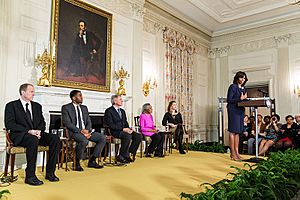
Chadwick's big break came in 2013 with the movie 42. In this film, he played the legendary baseball player Jackie Robinson. Chadwick was thinking about focusing only on directing, but he got the role after two auditions. The director liked his bravery. Jackie Robinson's widow, Rachel Robinson, said that Chadwick's performance was like seeing her husband again. To prepare, Chadwick trained for five months with baseball coaches. Critics praised his performance, saying he brought a strong presence to the role.
In 2014, Chadwick starred in another sports film, Draft Day. He then played James Brown in the 2014 movie Get on Up. He did his own singing and dancing for the role. He practiced for hours every day for two months. He didn't want to do another biopic so soon after playing Jackie Robinson, but the director insisted. Co-star Dan Aykroyd, who knew James Brown, praised Chadwick's performance. Critics loved his acting, calling it "unforgettable" and "dynamic."
Chadwick also sold a movie script to Universal Pictures in 2014. He still wanted to direct but decided to focus on acting first. In 2016, he played Thoth, an Egyptian god, in Gods of Egypt. He took the role because he wanted to make sure an African character was played by someone of African descent, as the film had faced criticism for its mostly white cast.
Marvel Cinematic Universe and Other Films (2016–2019)
In 2016, Chadwick Boseman began playing the Marvel Comics character T'Challa / Black Panther in the Marvel Cinematic Universe. His first movie as Black Panther was Captain America: Civil War. He didn't have to audition for the role; instead, he had a discussion with Marvel about their vision for the character. While filming, he learned some Xhosa from John Kani, who played his father in the movie. Chadwick insisted on using the language for his character. His performance in Civil War was highly praised.
Chadwick returned as Black Panther in the 2018 movie Black Panther, directed by Ryan Coogler. This movie focused on T'Challa and his home country of Wakanda. The film was a huge success and became one of the highest-grossing films ever. It was a landmark movie because it was the first big-budget film with a mostly Black cast and director. It was also the first superhero film to be nominated for an Academy Award for Best Picture. Critics loved the movie and Chadwick's performance. He was praised for bringing dignity and strength to T'Challa.
He played Black Panther again in Avengers: Infinity War (2018) and Avengers: Endgame (2019). Both movies were massive hits. His last physical appearance as Black Panther was in Endgame. He later voiced different versions of T'Challa in the 2021 animated series What If...?.
In 2017, Chadwick played Thurgood Marshall in the movie Marshall. The film showed one of Marshall's early court cases, years before he became the first African American Supreme Court Justice. Chadwick researched Marshall a lot for the role. Even though he worried about looking like Marshall, he took the role because he liked the script. Critics praised his performance.
In 2019, he starred in and produced the action thriller 21 Bridges. He worked with the Russo brothers, who directed Avengers movies. Chadwick helped make changes to the script, including making some characters female and non-white. He even gave some of his own salary to ensure Sienna Miller could be his co-star. He also called Stephan James personally to ask him to join the cast. Chadwick prepared for his role by going on calls with police departments.
Final Films (2020)
In 2019, Chadwick joined the cast of two Netflix films: Da 5 Bloods, directed by Spike Lee, and Ma Rainey's Black Bottom. He wanted to work with these famous directors and perform in an August Wilson play. He also planned to co-produce and star in a film about Yasuke, the only non-Asian samurai in Japan.
Da 5 Bloods was released in June 2020. Director Spike Lee chose Chadwick for the heroic character of Stormin' Norman. Critics generally liked his performance, calling it "charismatic."
Chadwick's final film, Ma Rainey's Black Bottom, was released after his death in 2020. He played a trumpeter named Levee. Director George C. Wolfe said Chadwick was excited by the challenge of the role. Critics praised his performance, calling it "astonishing" and "revelatory." For this role, Chadwick received nominations for Best Actor at the Academy Awards, Golden Globe Awards, and Screen Actors Guild Awards after he passed away.
In 2022, Chadwick won a Primetime Emmy Award for Outstanding Character Voice-Over Performance for his voice work as T'Challa in the What If...? episode "What If... T'Challa Became a Star-Lord?". This award was given after his death.
Appraisal and Legacy
Chadwick Boseman was a very talented actor who could truly become his characters. He was able to show the dignity of the people he played. He was known for taking on roles of real-life figures, and he dedicated himself to making them believable.
As Black Panther, Chadwick led a movie with a mostly Black cast, which was a huge step for Hollywood. His role was incredibly important for the African American community and for Black people around the world. He inspired many and showed that Black stories could be told on a grand scale. People said he "changed Hollywood" and was a "symbol of black excellence."
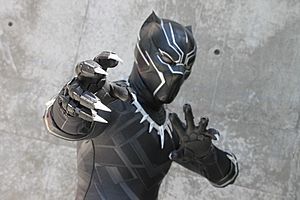
Rhea Combs, a film curator, said that Chadwick "represented brightness and the promise of tomorrow." He also helped connect African-American audiences with their African heritage through his work.
His college, Howard University, renamed its College of Fine Arts in his honor on May 26, 2021.
Personal Life
Family and Faith
Chadwick Boseman started dating singer Taylor Simone Ledward in 2015. They got engaged by October 2019 and later married in secret. His family shared this news when they announced his passing.
Chadwick was raised Christian and was baptized. He was part of a church choir and youth group. His former pastor said he always kept his faith. Chadwick once said he prayed to be the Black Panther before he was cast in the role.
Philanthropy
Chadwick supported many charities. He worked with cancer charities, like St. Jude Children's Research Hospital, even while he was battling cancer himself. He donated $10,000 to the Boys and Girls Club of Harlem. This helped provide free tickets for children to see Black Panther. In response, Disney donated $1 million to the Boys & Girls Clubs.
In April 2020, he donated $4.2 million in personal protective equipment (PPE) to hospitals. This PPE helped fight the COVID-19 pandemic in Black communities. He started his own "Operation 42" challenge to encourage others to donate PPE.
Advocacy
Chadwick supported the When We All Vote campaign, which encourages people to vote. His last tweet before he passed away was congratulating Kamala Harris on her selection as Joe Biden's running mate.
Illness and Death
Chadwick Boseman was diagnosed with colon cancer in 2016. The cancer became more serious before 2020. He never spoke publicly about his illness. Only a few close people knew he was sick. Even while getting treatment, including surgeries and chemotherapy, he continued to work. He completed several films during this time, including Marshall, Da 5 Bloods, and Ma Rainey.
Chadwick passed away at his home in Los Angeles on August 28, 2020. He was 43 years old. His wife and family were with him. He did not have a will, so his estate was managed by his wife. A public memorial service was held in his hometown of Anderson, South Carolina.
Tributes
After his passing, a petition was started to replace a Confederate monument in his hometown with a statue of Chadwick. It quickly gained many signatures. The Governor of South Carolina ordered flags to be lowered to half-staff in his honor.
ABC aired Black Panther without commercials, followed by a special tribute to Chadwick. The 2020 MTV Video Music Awards was also dedicated to him. In September 2020, Disney unveiled a mural called King Chad at Downtown Disney in California. Another mural was painted at Trilith Studios in Georgia in February 2021.
After winning an Academy Award in April 2021, Anthony Hopkins paid tribute to Chadwick, saying he was "taken from us far too early."
Chadwick is also remembered in the 2020 video game Marvel's Spider-Man: Miles Morales. The game includes a message dedicating it to him and a street named Boseman Way. Amazon also made Black Panther comic books free to read. On November 29, 2020, which would have been Chadwick's 44th birthday, Marvel changed the opening logo animation for Black Panther on Disney+ to include images of him.
Ryan Coogler, the director of Black Panther, said he was writing words for Chadwick to say in the sequel, but it was not meant to be. Coogler and Marvel Studios did not know Chadwick was ill until he passed away. Marvel confirmed that the role of T'Challa would not be recast. The sequel, Black Panther: Wakanda Forever (2022), shows T'Challa's passing from illness. The movie is a tribute to Chadwick Boseman.
Filmography
Film
| Year | Title | Role | Notes | Ref. |
|---|---|---|---|---|
| 2008 | The Express: The Ernie Davis Story | Floyd Little | ||
| 2012 | The Kill Hole | Lt. Samuel Drake | ||
| 2013 | 42 | Jackie Robinson | ||
| 2014 | Draft Day | Vontae Mack | ||
| 2014 | Get on Up | James Brown | ||
| 2016 | Gods of Egypt | Thoth | ||
| 2016 | Captain America: Civil War | T'Challa / Black Panther | ||
| 2016 | Message from the King | Jacob King | Also executive producer | |
| 2017 | Marshall | Thurgood Marshall | Also co-producer | |
| 2018 | Black Panther | T'Challa / Black Panther | ||
| 2018 | Avengers: Infinity War | |||
| 2019 | Avengers: Endgame | |||
| 2019 | 21 Bridges | Andre Davis | Also producer | |
| 2020 | Da 5 Bloods | Norman Earl "Stormin' Norm" Holloway | ||
| 2020 | Ma Rainey's Black Bottom | Levee Green | Posthumous release | |
| 2022 | Black Panther: Wakanda Forever | T'Challa / Black Panther | Archive Footage; Posthumous release |
Television
| Year | Title | Role | Notes | Ref. |
|---|---|---|---|---|
| 2003 | All My Children | Reggie Porter | Recurring role | |
| 2003 | Third Watch | David Wafer | Episode: "In Lieu of Johnson" | |
| 2004 | Law & Order | Foster Keyes | Episode: "Can I Get a Witness?" | |
| 2006 | CSI: NY | Rondo | Episode: "Heroes" | |
| 2008 | ER | Derek Taylor | Episode: "Oh, Brother" | |
| 2008 | Cold Case | Dexter Collins | Episode: "Street Money" | |
| 2008–2009 | Lincoln Heights | Nathaniel "Nate" Ray | 9 episodes | |
| 2009 | Lie to Me | Cabe McNeil | Episode: "Truth or Consequences" | |
| 2010 | Persons Unknown | Sergeant McNair | Main role; 13 episodes | |
| 2010 | The Glades | Michael Richmond | Episode: "Honey" | |
| 2011 | Castle | Chuck Russell | Episode: "Poof, You're Dead" | |
| 2011 | Detroit 1-8-7 | Tommy Westin | Episode: "Beaten/Cover Letter" | |
| 2011 | Justified | Ralph Beeman | Episode: "For Blood or Money" | |
| 2011 | Fringe | Mark Little / Cameron James | Episode: "Subject 9" | |
| 2018 | Saturday Night Live | Himself (host) | Episode: "Chadwick Boseman/Cardi B" | |
| 2021 | What If...? | Versions of T'Challa / Black Panther (voice) | Recurring role; 4 episodes; posthumous release |
As director
| Year | Title | Notes | Ref. |
|---|---|---|---|
| 2008 | Blood Over a Broken Pawn | Short film | |
| 2013 | Heaven | Short film |
Playwright
| Year | Title | Role | Notes | Ref. |
|---|---|---|---|---|
| 1993 | Crossroads | Playwright | Unproduced College play | |
| 1997–2000 | Rhyme Deferred | Co-writer Performer |
Part of the Hip Hop Theatre Anthology The Fire This Time | |
| 2002 | Hieroglyphic Graffiti | Playwright | Produced at Negro Playwright's Theatre Kuntu Repertory Theatre National Black Theatre Festival Hip Hop Theatre Festival |
|
| 2005 | Deep Azure | Playwright | Produced by Congo Square Theatre Company Work-shopped at the Folger Shakespeare Library Apollo Theater |
Awards and Honors
| Location | Date | School | Degree |
|---|---|---|---|
| District of Columbia | May 12, 2018 | Howard University | Doctor of Humane Letters (DHL) |
- Chadwick gave the commencement speech at Howard University on May 12, 2018.
|
See also
 In Spanish: Chadwick Boseman para niños
In Spanish: Chadwick Boseman para niños
- Chadwick Boseman: Portrait of an Artist
- List of black Academy Award winners and nominees
- List of posthumous Academy Award winners and nominees
- List of black Golden Globe Award winners and nominees
 | James B. Knighten |
 | Azellia White |
 | Willa Brown |


